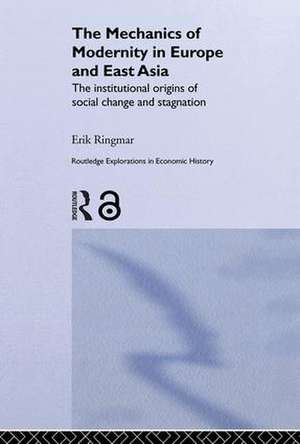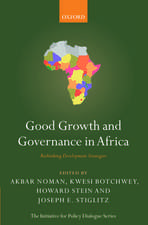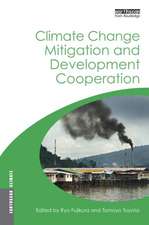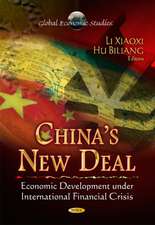The Mechanics of Modernity in Europe and East Asia: Institutional Origins of Social Change and Stagnation: Routledge Explorations in Economic History
Autor Erik Ringmaren Limba Engleză Hardback – 19 mai 2005
| Toate formatele și edițiile | Preț | Express |
|---|---|---|
| Paperback (1) | 418.65 lei 6-8 săpt. | |
| Taylor & Francis – 12 aug 2009 | 418.65 lei 6-8 săpt. | |
| Hardback (1) | 1003.43 lei 6-8 săpt. | |
| Taylor & Francis – 19 mai 2005 | 1003.43 lei 6-8 săpt. |
Din seria Routledge Explorations in Economic History
-
 Preț: 380.85 lei
Preț: 380.85 lei -
 Preț: 310.96 lei
Preț: 310.96 lei - 9%
 Preț: 934.30 lei
Preț: 934.30 lei -
 Preț: 326.97 lei
Preț: 326.97 lei -
 Preț: 309.12 lei
Preț: 309.12 lei -
 Preț: 312.65 lei
Preț: 312.65 lei -
 Preț: 154.97 lei
Preț: 154.97 lei -
 Preț: 371.51 lei
Preț: 371.51 lei -
 Preț: 325.09 lei
Preț: 325.09 lei - 8%
 Preț: 383.81 lei
Preț: 383.81 lei - 25%
 Preț: 824.17 lei
Preț: 824.17 lei - 18%
 Preț: 1113.95 lei
Preț: 1113.95 lei -
 Preț: 422.00 lei
Preț: 422.00 lei - 21%
 Preț: 304.74 lei
Preț: 304.74 lei - 18%
 Preț: 1067.84 lei
Preț: 1067.84 lei - 18%
 Preț: 1056.95 lei
Preț: 1056.95 lei -
 Preț: 419.50 lei
Preț: 419.50 lei - 25%
 Preț: 1193.01 lei
Preț: 1193.01 lei - 18%
 Preț: 1055.21 lei
Preț: 1055.21 lei - 18%
 Preț: 1175.51 lei
Preț: 1175.51 lei - 25%
 Preț: 766.65 lei
Preț: 766.65 lei - 18%
 Preț: 1433.54 lei
Preț: 1433.54 lei - 18%
 Preț: 1163.63 lei
Preț: 1163.63 lei -
 Preț: 484.47 lei
Preț: 484.47 lei - 18%
 Preț: 1065.06 lei
Preț: 1065.06 lei - 25%
 Preț: 997.11 lei
Preț: 997.11 lei - 18%
 Preț: 1385.39 lei
Preț: 1385.39 lei - 25%
 Preț: 855.59 lei
Preț: 855.59 lei - 18%
 Preț: 1077.57 lei
Preț: 1077.57 lei - 18%
 Preț: 1166.80 lei
Preț: 1166.80 lei - 18%
 Preț: 1126.82 lei
Preț: 1126.82 lei - 25%
 Preț: 851.46 lei
Preț: 851.46 lei - 18%
 Preț: 1175.01 lei
Preț: 1175.01 lei - 42%
 Preț: 195.71 lei
Preț: 195.71 lei - 18%
 Preț: 1059.84 lei
Preț: 1059.84 lei - 18%
 Preț: 1057.05 lei
Preț: 1057.05 lei - 18%
 Preț: 1334.10 lei
Preț: 1334.10 lei - 43%
 Preț: 216.41 lei
Preț: 216.41 lei - 26%
 Preț: 822.54 lei
Preț: 822.54 lei - 18%
 Preț: 1168.09 lei
Preț: 1168.09 lei - 25%
 Preț: 1482.69 lei
Preț: 1482.69 lei -
 Preț: 485.99 lei
Preț: 485.99 lei - 18%
 Preț: 1164.92 lei
Preț: 1164.92 lei - 18%
 Preț: 1058.79 lei
Preț: 1058.79 lei - 18%
 Preț: 1064.70 lei
Preț: 1064.70 lei - 26%
 Preț: 821.53 lei
Preț: 821.53 lei - 25%
 Preț: 851.99 lei
Preț: 851.99 lei
Preț: 1003.43 lei
Preț vechi: 1223.70 lei
-18% Nou
Puncte Express: 1505
Preț estimativ în valută:
192.03€ • 198.38$ • 159.82£
192.03€ • 198.38$ • 159.82£
Carte tipărită la comandă
Livrare economică 25 martie-08 aprilie
Preluare comenzi: 021 569.72.76
Specificații
ISBN-13: 9780415342544
ISBN-10: 0415342546
Pagini: 276
Dimensiuni: 156 x 234 x 20 mm
Greutate: 0.54 kg
Ediția:1
Editura: Taylor & Francis
Colecția Routledge
Seria Routledge Explorations in Economic History
Locul publicării:Oxford, United Kingdom
ISBN-10: 0415342546
Pagini: 276
Dimensiuni: 156 x 234 x 20 mm
Greutate: 0.54 kg
Ediția:1
Editura: Taylor & Francis
Colecția Routledge
Seria Routledge Explorations in Economic History
Locul publicării:Oxford, United Kingdom
Public țintă
Postgraduate and ProfessionalNotă biografică
Erik Ringmar is in the Department of Government at the London School of Economics
Cuprins
Acknowledgements, PART I The logic, PART II Reflection, PART III Entrepreneurship, PART IV Pluralism, PART V European paths to modernity, PART VI China, PART VII Reform and revolution in Japan and China, PART VIII The future of modern society, Notes, Bibliography, Index
Descriere
This book provides a new answer to the old question of the 'rise of the west': why did some countries embark on a path of sustained economic growth while others stagnated? Taking a global view, Ringmar investigates the implications of his conclusions on issues facing the developing world today.























